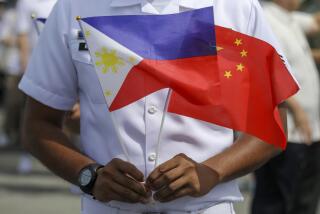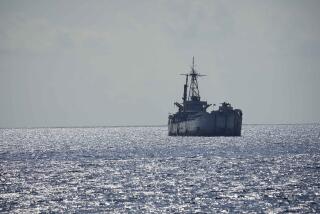A History of Hostility in Philippines
JOLO, Philippines â When U.S. troops land on this forbidding jungle island in the coming weeks, they will find a proud tribal people with a historic hatred of the United States and a deep suspicion of American motives.
They will find a land where mothers put their children to bed with lullabies telling them to become strong so they can avenge atrocities by U.S. forces a century ago.
They will find a place where poverty is widespread and much of the population is armed. It is a lawless land where taking hostages is a cottage industry and many islanders cling to the memory of their forefathers as fierce warriors and pirates. Foreigners are discouraged from visiting the island without an armed escort.
Jolo island is the last remaining stronghold of the Abu Sayyaf, a bold gang of kidnappers who specialize in snatching foreign tourists from beach resorts. No date has been set for the arrival of U.S. troops, but their mission will be to help the Philippine armed forces eradicate the outlaw band.
Whether the Americans hunt down the Abu Sayyaf or help train Philippine forces to do the job -- an issue that is still a matter of dispute -- much of their success will depend on winning local support.
Most islanders have no love for the bandits and are eager for economic assistance from the outside world. They hope that the arrival of the Americans will mean new roads and better medical care.
âWe approve of the coming of Americans for training and development, but they should not go beyond that and kill innocent civilians,â said Haja Jalhana Mukakil, 30, a street vendor who sells toothpaste and small toys from a tarp spread on the sidewalk. âWe are very apprehensive about that.â
Jolo is the main island of overwhelmingly Muslim Sulu province, the poorest province in this predominantly Roman Catholic country.
In the town of Jolo, squatters who cannot afford to buy land have built entire villages on stilts in the sea. The island has beautiful beaches, but no travelers visit them for fear of being kidnapped.
About 95% of the islandâs people are Tausug, an Islamic tribe that has fought invaders for centuries -- first the Spaniards, then the Americans and the Japanese.
After the Philippines became a U.S. colony in 1898, Washington sent troops to subdue the Tausugs. They fought with traditional long knives known as bolos against soldiers who were armed with guns. The tribesmen earned a reputation for being unstoppable even when wounded.
Tausugs boast that the .45-caliber pistol was developed to stop their ancestors in their tracks.
During the American campaign, Philippine historians say, U.S. troops under Gen. John J. Pershing committed atrocities against the Tausugs. The troops massacred hundreds, perhaps thousands, of people, including women and children, they say. Photos taken at the time show American soldiers standing amid hundreds of bodies.
Now, some Tausugs welcome an opportunity to fight the Americans.
âThey have been rejoicing over the news that the Americans are coming,â Parouk Hussin, a Tausug who is governor of a Muslim autonomous region that includes Jolo, said in an interview. âThey say, âThis is our chance to avenge the atrocities committed against our forefathers.â â
Given the hostility that already exists, the U.S. operation has not gotten off to a good start.
The Pentagon announced last week that 3,000 troops would be sent to Jolo to fight the Abu Sayyaf. Among them would be 750 Special Forces troops and 1,000 Marines in ships offshore to back them up in combat operations.
The Philippine government, however, denied that U.S. troops would go into combat because that would violate Philippine law. Instead, Philippine officials said the Americans would provide training and high-tech equipment as they did last year for a successful operation that pushed the Abu Sayyaf out of Basilan island 77 miles northeast.
The disagreement between the two countries has not been resolved. Philippine Defense Secretary Angelo Reyes is scheduled to meet this week in Washington with Pentagon officials to discuss terms of the operation.
In Jolo, uncertainty over the plan has heightened anxiety among the public and contributed to suspicion about the United Statesâ intentions.
Many Tausugs find it hard to understand why Washington would be so concerned about a ragtag band of 200 criminals hiding in the jungle on a remote island far from the U.S. They suspect that the Americans have an ulterior motive.
One theory is that the U.S. is sending the troops to search for treasure hidden by the Japanese during World War II.
Others suspect that the Bush administration wants to establish a base in the region to further what is viewed as its goal of global domination. Some suspect that the Americans are coming to harvest the provinceâs resources, such as oil and timber. Still others believe that the troops are coming to kill Muslims.
Few accept the Bush administrationâs contention that it is pursuing the Abu Sayyaf, which has links to Osama bin Laden, simply as part of its declared war on terror.
âIf they come to fight, maybe a big war will happen,â said Abden Mohammad, a 22-year-old Islamic teacher. âAs Muslims, we are all soldiers. You can call us moujahedeen. We must defend our place. Our religion obligates us to fight.â
At a public forum convened Wednesday to discuss the U.S. troop deployment, Grand Imam Yacob Ismii received some of the biggest applause of the day when he declared: âIt is better to die than to surrender to the enemy.â He did not define whom he considered to be the enemy.
Knowing that economic assistance often arrives on the heels of American troops, some Jolo islanders hope that the U.S. can do for the province what the Philippine government has not.
In the center of this seedy town where few Americans ever set foot, a small sign of welcome has arrived. It is a U.S. flag that street vendor Nul bin Sali is selling for 25 pesos -- about 50 cents.
âIâm agreeable to the coming of Americans as long as they obey our laws and donât fight Muslim people,â said Bin Sali, who is 35 but is missing most of his teeth.
âWe like the idea of American people helping the soldiers fight the Abu Sayyaf.â
Sahie S. Udjah, a professor of public administration at Mindanao State University, is skeptical of Washingtonâs plans but is willing to give the United States a chance.
âWe donât like what the Abu Sayyaf has done,â Udjah said.
More to Read
Sign up for Essential California
The most important California stories and recommendations in your inbox every morning.
You may occasionally receive promotional content from the Los Angeles Times.










